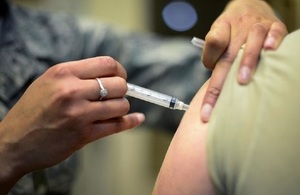Flu vaccine effectiveness in 2017 to 2018 season
Public Health England has published flu vaccine effectiveness data for the 2017 to 2018 season.

Public Health England (PHE) has today (Wednesday, 18 July 2018) published data on the effectiveness of the flu vaccine in the 2017 to 2018 season. The data show that overall, flu vaccine was 15% effective in all age groups. However, effectiveness varied considerably. By age-group, the vaccine was overall:
- 26.9% effective in children aged 2 to 17 years (who received the nasal spray)
- 12.2% in at risk groups aged 18 to 64 years
- 10.1% in those aged 65 and over
There were higher levels of protection against flu B and H1N1pdm09, especially in children (60.8% effective against flu B and 90.3% against H1N1pdm09 in children).
Read the full influenza vaccine effectiveness: seasonal estimates data.
In 2018 to 2019, a new ‘booster’ vaccine is being made available for all those aged 65 and over which should provide better protection than the current vaccines. We are also recommending that the quadrivalent vaccine, which protects against 4 strains of flu rather than 3 and is currently used for all children under 18 years of age, is made available to all adults in at-risk groups aged between 16 to 64 years.
Dr Paul Cosford, Director for Health Protection and Medical Director, said:
Vaccine effectiveness varies year on year as the flu virus changes and is difficult to predict. Last winter’s flu vaccine provided good protection against A(H1N1)pdm09 and good protection for the quadrivalent vaccine in children against the main Flu B strain which circulated last season. This upcoming season we are recommending that all those under 65 have the quadrivalent flu vaccine, which protects against both the main B strains and the 2 main flu A subtypes. We are also making a new booster vaccine available for all adults aged 65 or over in order to improve the immune response.
The vaccine offered lower protection against Flu A(H3N2), which also circulated. This is likely due to several factors including a suboptimal match between the main circulating A(H3N2) viruses and the vaccine, the strains for which are recommended by the World Health Organization each year.
Vaccines are the best defence we have against flu and not only protect people who have received the vaccine but also those around them. We encourage everyone eligible to take up the offer of the vaccine this winter.